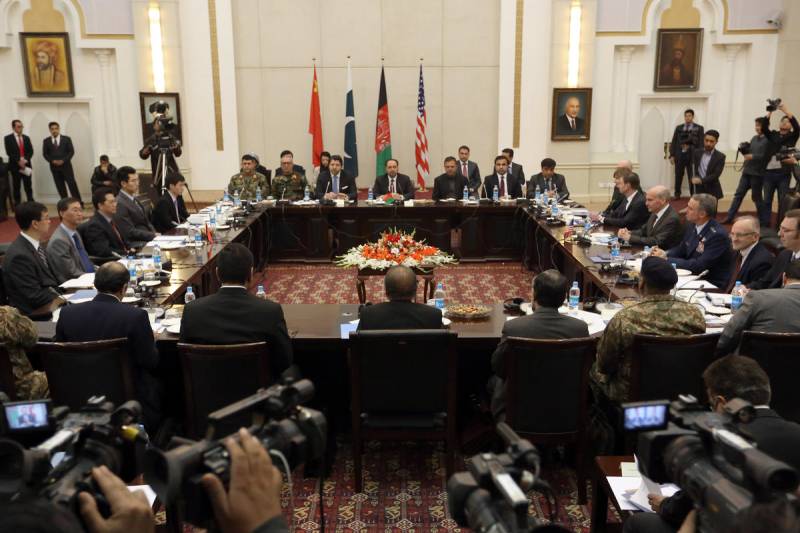
Pakistan joined the US, Russia and China over the weekend to craft a peace agreement with the Taliban, a development that shows how Islamabad has moved to the centre stage of the Afghan peace process, and how India has been dealt out of the future of Afghanistan, the Times of India said in a report
“India's participation or voice has been negligible in the evolving situation, while Pakistan has used the opportunity to manoeuvre itself to centre stage of the region's geopolitics,” said the Indian newspaper.
On July 12, the four countries met in Beijing to issue a 'four-party joint statement on the Afghan peace process.
The statement "welcomed recent positive progress as the crucial parties concerned have advanced their talks and increased contacts with each other. All sides also welcomed intra-Afghan meetings held in Moscow and Doha. … The four sides encouraged all parties to take steps to reduce violence leading to a comprehensive and permanent ceasefire that starts with intra-Afghan negotiations."
Not surprisingly, it comments, “India is nowhere in the peace negotiations, nor have India's concerns really found any traction.”
In the latest blow to India, US ambassador to Afghanistan, John Bass, on Thursday said that Afghanistan's presidential elections, scheduled for September 28, could be postponed, until the peace process with the Taliban was completed.
Mentioning that India is opposed to this suggestion, it said Indian NSA Ajit Doval, during the visit of US Secretary of State Mike Pompeo, repeatedly stressed the importance of holding elections in Afghanistan on schedule even if the peace process was on. India also opposed the proposal to have an interim government in Afghanistan, both with US special envoy Zalmay Khalilzad and with Russia.
“None of India's concerns cut much ice with any of the principal stakeholders in Afghanistan.”
Amid these developments, the newspaper said, “India's 18-year investment in Afghanistan has been largely with the government of the day.”
The US has succeeded in bringing Russia and China on the same page, and last week they included Pakistan which is playing a crucial role of bringing the Taliban to the table and keeping them there.
The Doha agreement of between the US and Taliban includes the agreements reached in Moscow, thereby taking care of Russia's interests. China and Pakistan look out for each other. “India is out of the picture, despite having vital security interests. Interestingly, former Afghan president Hamid Karzai, believed to be close to India, became a facilitator of the Taliban talks both in Moscow and in Beijing.”
“Pakistan finds itself in a much happier position. Having proved their indispensability, Pakistan has been a recipient of aid from US's principal allies Saudi Arabia, UAE and Qatar, as well as an IMF bailout. China remains Pakistan's principal ally and benefactor, but the US, despite Trump's mean tweets about Pakistan, is getting ready to fete Imran Khan in Washington next week,” said Times of India.
“India's participation or voice has been negligible in the evolving situation, while Pakistan has used the opportunity to manoeuvre itself to centre stage of the region's geopolitics,” said the Indian newspaper.
On July 12, the four countries met in Beijing to issue a 'four-party joint statement on the Afghan peace process.
The statement "welcomed recent positive progress as the crucial parties concerned have advanced their talks and increased contacts with each other. All sides also welcomed intra-Afghan meetings held in Moscow and Doha. … The four sides encouraged all parties to take steps to reduce violence leading to a comprehensive and permanent ceasefire that starts with intra-Afghan negotiations."
Not surprisingly, it comments, “India is nowhere in the peace negotiations, nor have India's concerns really found any traction.”
In the latest blow to India, US ambassador to Afghanistan, John Bass, on Thursday said that Afghanistan's presidential elections, scheduled for September 28, could be postponed, until the peace process with the Taliban was completed.
Mentioning that India is opposed to this suggestion, it said Indian NSA Ajit Doval, during the visit of US Secretary of State Mike Pompeo, repeatedly stressed the importance of holding elections in Afghanistan on schedule even if the peace process was on. India also opposed the proposal to have an interim government in Afghanistan, both with US special envoy Zalmay Khalilzad and with Russia.
“None of India's concerns cut much ice with any of the principal stakeholders in Afghanistan.”
Amid these developments, the newspaper said, “India's 18-year investment in Afghanistan has been largely with the government of the day.”
The US has succeeded in bringing Russia and China on the same page, and last week they included Pakistan which is playing a crucial role of bringing the Taliban to the table and keeping them there.
The Doha agreement of between the US and Taliban includes the agreements reached in Moscow, thereby taking care of Russia's interests. China and Pakistan look out for each other. “India is out of the picture, despite having vital security interests. Interestingly, former Afghan president Hamid Karzai, believed to be close to India, became a facilitator of the Taliban talks both in Moscow and in Beijing.”
“Pakistan finds itself in a much happier position. Having proved their indispensability, Pakistan has been a recipient of aid from US's principal allies Saudi Arabia, UAE and Qatar, as well as an IMF bailout. China remains Pakistan's principal ally and benefactor, but the US, despite Trump's mean tweets about Pakistan, is getting ready to fete Imran Khan in Washington next week,” said Times of India.
